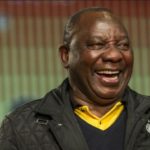Although they are a small minority in the Republic of South Africa, white farmers own most of the land. Under an openly racist redistributionist policy announced by South Africa’s new president, Cyril Ramaphosa (shown), land will be taken away from whites and given to black South Africans — all without any compensation.
In an address to the parliament meeting in Cape Town a few days ago, Ramaphosa said, “The expropriation of land without compensation is envisaged as one of the measures that we will use to accelerate redistribution of land to black South Africans.”
He claimed that this will heal divisions and injustices of the past, arguing that the original European colonists took land away from indigenous black tribes 400 years ago.
Confiscation is another word for theft, all done under the cover of law — what 19th-century French philosopher Frédéric Bastiat aptly called “legal plunder.” Besides its dubious morality, this policy has predictable economic consequences.
All South Africans have to do is look next door to neighboring Zimbabwe, formerly known as Rhodesia. Rhodesia was another black-majority nation with a white minority that ran the government and owned most of the land, until pushed into opening the polls to the black majority. That is when Robert Mugabe, a self-proclaimed Marxist-Leninist, took over the country after winning the 1980 general election. Almost immediately, Mugabe began a land-redistribution program.
Land was taken from white farmers by the Mugabe regime, forcing the farmers off the land. At the time, Zimbabwe was a net exporter of food, especially to neighboring African nations. But as the professional farmers were driven off the land, and many chose to leave the country, food production plummeted. Now, the country relies on food assistance from the United Nations.
Under Mugabe’s socialist economy, Zimbabwe became a laughingstock, with a hyperinflation that destroyed the monetary system and led to a deep economic depression, now decades old. Finally, Mugabe was ousted in a coup d’etat in 2017.
In contrast, South Africa ended apartheid in 1994, with Nelson Mandela taking over as president. Mandela was no free market person, either. In fact, he had been a secret member of the South African Communist Party, even on its executive committee. But when his African National Congress (ANC) came to power, he opted to make moves toward national reconciliation, even supporting the Springboks’ (the white rugby team) bid to win the 1995 World Rugby Cup. He wore their team shirt to the finals, and presented the trophy to Francois Pienaar, the Afrikaner (white of Dutch ancestry) captain.
He appointed former white President F.W. de Klerk as deputy president. His unexpected moderate views led to criticism from the ANC.
But most importantly, he did not seize white-owned land. In fact, he publicly criticized the harsh policies of Mugabe in 2007.
Yet, Ramphosa is choosing to follow the path of Robert Mugabe. “For it to serve this purpose, we will need to locate this measure within a broad and comprehensive land redistribution and agricultural development program. This is a profound responsibility that has been given to our generation. We owe it to our ancestors and to our children to ensure that we fulfil it.”
The twin examples of Rhodesia, now Zimbabwe, and South Africa, demonstrate to us, in a powerful way, that respect for private property is a foundational principle of economic prosperity and also of liberty. Why did the white minorities in Rhodesia and South Africa fear giving the majority black population the vote? It was not so much that one group was white and one was black; the issue was one of respect, or lack thereof, for private property and limited government.
If government is limited in its scope to simply protecting life, liberty, and property; recording deeds and economic transactions; enforcing contracts; and punishing and controlling crime, then it makes little difference who votes and who does not. But when the majority can simply vote to take property away from the minority, voting can produce a tyranny as real as any oligarchy or monarchy.
Such redistribution is based upon the socialist concept that there is a limited amount of wealth in a country, so it must be redistributed. In this case, the argument is made that redistribution must take place to make up for supposed injustices from four centuries ago.
The end result will be the same in South Africa as it was in Zimbabwe. We can safely predict that if South Africa goes down this road of legal plunder, within a few years, their economy will be the basketcase that is now Zimbabwe. Instead of government taking property, the path to a better economy, as well as a more moral society, is for government to perform its proper role and protect property. This inspires others to build their own wealth, knowing their property will likewise be protected.
But knowing that private property is not respected only leads to disaster.
Source: theZimbabwemail



